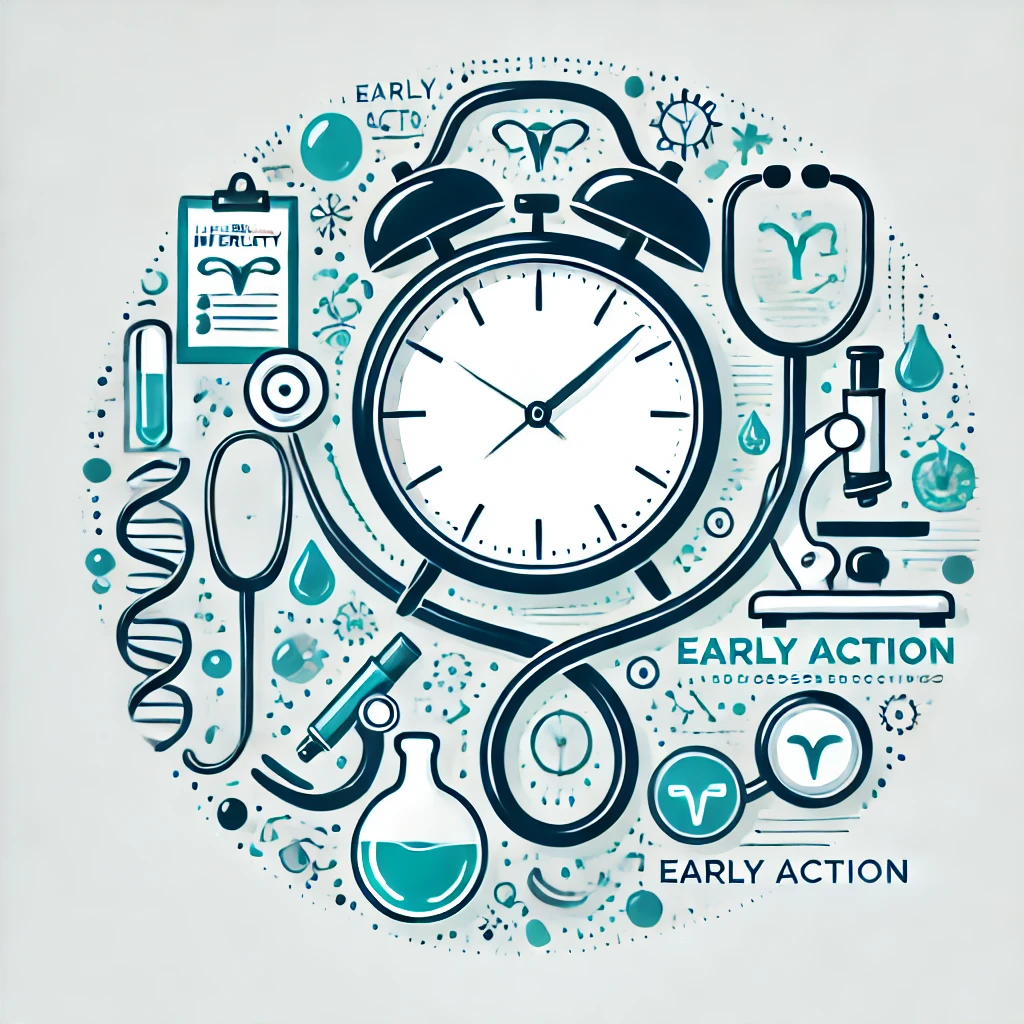Understanding Infertility: How Early Action Can Improve Success Rates


Early Action and Infertility Success
| Aspect | Key Insight |
|---|---|
| Importance of Early Action | Early diagnosis and treatment significantly improve the chances of conception. |
| Common Causes of Infertility | Hormonal imbalances, ovulation disorders, male factor infertility, and structural issues. |
| Diagnostic Methods | Blood tests, imaging, semen analysis, and genetic testing help pinpoint infertility causes. |
| Treatment Options | Include lifestyle changes, medications, ART like IVF, and surgical interventions. |
| Success Rates | Success rates improve dramatically with early diagnosis and tailored treatment plans. |
Introduction
Infertility affects millions of couples worldwide, but early action can drastically improve the chances of achieving parenthood. By identifying and addressing the root causes promptly, couples can take advantage of advanced treatments and increase their likelihood of success. This article explores the causes of infertility, the importance of early action, and the available diagnostic and treatment options.
Why Early Action Matters
1. Increases Success Rates
- Biological Clock: For women, fertility declines with age, particularly after 35. Early action ensures more treatment options and higher success rates.
- Improves Outcomes: Early diagnosis allows for timely interventions, increasing the probability of conception.
2. Minimizes Emotional and Financial Strain
- Reduces the uncertainty and stress associated with prolonged attempts to conceive.
- Avoids escalating costs from delayed treatments and additional complications.
3. Addresses Underlying Conditions
- Early action can identify and manage conditions like polycystic ovary syndrome (PCOS), endometriosis, or hormonal imbalances before they worsen.
Common Causes of Infertility
Infertility can stem from a variety of factors, affecting either partner or both. Below are some of the most common causes:
For Women:
- Ovulation Disorders:
- Conditions like PCOS or thyroid dysfunction disrupt egg release.
- Age-Related Decline:
- Fertility decreases significantly after age 35 due to a reduced ovarian reserve.
- Blocked Fallopian Tubes:
- Often caused by pelvic inflammatory disease or previous surgeries.
- Uterine Abnormalities:
- Fibroids or polyps can interfere with implantation.
For Men:
- Low Sperm Count or Motility:
- Reduces the likelihood of successful fertilization.
- Hormonal Imbalances:
- Affects testosterone and sperm production.
- Structural Issues:
- Blockages or defects in the reproductive tract hinder sperm delivery.
- Lifestyle Factors:
- Smoking, excessive alcohol, and obesity negatively impact fertility.
Diagnostic Methods
Prompt diagnosis is key to addressing infertility effectively. Common diagnostic methods include:
For Women:
- Blood Tests: To measure hormone levels like FSH, LH, and AMH, which indicate ovarian reserve and ovulation status.
- Ultrasound Imaging: To evaluate ovarian health and detect uterine abnormalities.
- Hysterosalpingography (HSG): A specialized X-ray to check for blockages in the fallopian tubes.
For Men:
- Semen Analysis: Assesses sperm count, motility, and morphology.
- Hormonal Testing: Identifies imbalances affecting sperm production.
- Genetic Testing: Detects genetic conditions that may affect fertility.
Treatment Options
Early diagnosis opens the door to a wide range of effective treatment options:
1. Lifestyle Modifications
- Maintaining a healthy weight, managing stress, and avoiding smoking or alcohol can significantly improve fertility for both partners.
2. Medications
- Clomiphene Citrate (Clomid): Stimulates ovulation in women with irregular cycles.
- Hormonal Therapy: Addresses deficiencies in estrogen, progesterone, or testosterone.
3. Assisted Reproductive Technologies (ART)
- Intrauterine Insemination (IUI): Places sperm directly into the uterus to enhance fertilization chances.
- In Vitro Fertilization (IVF): Fertilizes eggs outside the body and transfers embryos to the uterus.
- Intracytoplasmic Sperm Injection (ICSI): Directly injects sperm into an egg, beneficial for severe male infertility.
4. Surgical Interventions
- For Women: Surgery can treat fibroids, endometriosis, or blocked fallopian tubes.
- For Men: Procedures like varicocele repair or sperm retrieval improve fertility outcomes.
Success Rates with Early Action
The earlier infertility is addressed, the better the outcomes:
- Natural Conception: Early treatment for mild infertility issues can restore natural conception within months.
- IVF Success Rates: Women under 35 have a success rate of 40-50%, which decreases significantly with age.
- Cumulative Success: With multiple ART cycles, the success rate for achieving pregnancy often exceeds 80%.
The Emotional Aspect of Infertility
Infertility can be emotionally challenging for couples. Early action not only improves physical outcomes but also reduces the emotional toll:
- Counseling Services: Help couples navigate stress, anxiety, and relationship challenges.
- Support Groups: Provide a sense of community and shared experiences.
Conclusion
Understanding infertility and taking early action are vital steps toward achieving parenthood. By identifying causes promptly and pursuing tailored treatments, couples can improve their chances of success while minimizing stress and financial strain. With advances in reproductive medicine, hope is always within reach.
Contact Us for expert guidance on infertility diagnosis, treatments, and support options. Together, we can create a personalized plan to help you achieve your dreams of parenthood.
FAQs
-
When should we see a fertility specialist?
- Couples under 35 should seek help after 12 months of trying, while those over 35 should consult a specialist after 6 months.
-
Can infertility be treated without IVF?
- Yes, many cases can be treated with lifestyle changes, medications, or less invasive procedures like IUI.
-
What factors affect IVF success rates?
- Age, embryo quality, and uterine health are key factors influencing success rates.
-
Is male infertility as common as female infertility?
- Yes, male factor infertility accounts for about 30-40% of cases.
-
Does stress impact fertility?
- While stress alone doesn’t cause infertility, it can affect overall health, which may indirectly influence fertility.



